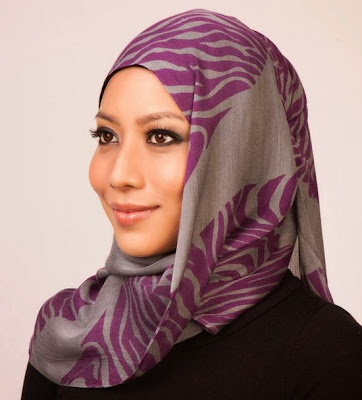Picture a two-minute video portraying
fashionable young women sporting colorful clothing, classy high heels, and
exotic gold dangly earrings while skateboarding through an alleyway, climbing
on railings and lampposts, and strutting through nature to Jay-Z’s jazzy, fresh
new song “Somewhere in America”. Now
imagine how much cooler this seems when I tell you all of these fabulous women
are wearing the hijab, the religious garment Muslim women wear to cover their
hair.
While this video is undeniably attractive to
both the eyes and ears, the filmmakers’ intentions are either faulty or simply
lacking. The video presents the hijab as a garment of fashion, failing to show
the depth the women in the video are capable of. For those who claim that this is just a fun
video for hijabi girls to show how normal they are, I would like to ask why we
as a community feel the need to prove ourselves by showing how capable we are
of reflecting these "hipster" and "American" qualities, instead
of showing a more authentic portrayal of who these women are.
“Mipsterz” is the name, a combination of the
words “Muslim” and “hipsters”, used to refer to a new movement of individuals
who have a fused identity somewhere in between their free-thinking, Western
environment and traditional, Islamic background. Though the Mipsterz from this
video are irrefutably cool to the average American teen, who usually sees
Muslim women as obedient and repressed individuals cloaked behind a full-body
sheet of black, I for one would have liked to see some of the personality and
character behind these female characters.
Most all the females in the video, referred to
as “models” by the credits on the video page, are portrayed as fashionistas who
happen to be able to implement the hijab into their outfits. They are seen with Chanel shirts, expensive
watches, and sophisticated high heels.
The element of the hijab almost seems marginal, as if its presence was
an accident. The focus is fashion. What viewers would not know from the video is that the girl eating
the ice cream is an MIT graduate. The girl riding the skateboard in heels is a
successful entrepreneur who founded her own clothing line of scarves. The one
found climbing the tree is a successful reporter on women’s issues in the
Middle East.
Why
did the filmmaker choose to show these women as flat characters? These women are all influential figures who
are pursuing careers and doing big things. The fact that they wear the hijab
makes this video an even more opportune moment to show that in addition to
being hipster, hijabi women can be powerful and courageous actors who are out
to change the world.
Ibtihaj Muhammad, the first Muslim woman to
compete for the U.S. in an international competition, is featured in the video
fencing with her partner. These few
seconds in the video with Ibtihaj stand out to me as the only segment that
presents a hijabi woman for something other than her physical appeal or
wardrobe choice. These moments focus on
Ibtihaj as an athlete.
Another well-known woman from the video is Noor
Tagouri, a journalist who is working to become the first veiled anchorwoman in
America. From the video, a viewer cannot
infer that she is a passionate individual with a goal in mind. Instead, Noor is featured doing cartwheels in
the grass. Even though this is a fun
portrayal of a girl in a hijab enjoying herself, the potential for these
individuals and this video is much greater.
A better portrayal of Noor would be having her behind the desk at a news
station, as photos from her Facebook page show her. Even better, as the audience I would have
even liked to hear from Noor herself, maybe to hear about what the hijab means
to her or to find out what project she is currently working on so that she can
reach the anchorwoman position.
My point is that there is no point. If a girl
wandering around a park with a hijab on is supposed to be saying something
noteworthy, I guess I am not hearing it. Apart from the scene with Ibtihaj
Muhammad where her talents are reflected, the other women are not really doing
much. As a filmmaker, when your models
not only are intelligent but also have the ability to represent an overlooked
and misrepresented demographic, you have a responsibility to do your models and
the audience justice by presenting the depth these women are capable of. Because if standing around looking fabulous
as a Muslim is an attempt to impress the audience, that only points to the
ignorance and low expectations we have of these women in the first place.

















